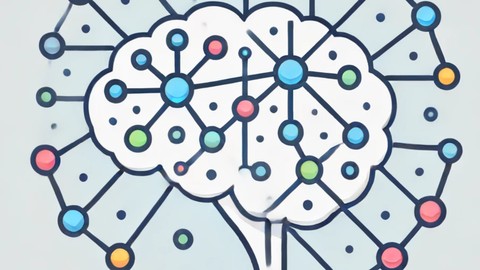Introduction to Machine Learning
Preview this Course
What you'll learn
- Understand Machine Learning Fundamentals
- Preprocess Data: Perform data cleaning, handle missing values, and conduct feature engineering on datasets.
- Normalize and Standardize Data: Apply normalization and standardization techniques to prepare data for machine learning models.
- Explore Data Visually: Use data visualization techniques to understand data distributions and identify patterns.
- Perform Statistical Analysis: Conduct basic statistical analysis to summarize data characteristics.
- Analyze and preprocess the datasets to prepare it for machine learning modeling.
- Build a Simple Models: Construct a logistic regression model to predict outcomes.
- Evaluate Model Performance: Use accuracy, precision, recall, and F1-score to evaluate the performance of machine learning models.
- Split Data into Training and Testing Sets: Implement data splitting techniques to create training and testing datasets.
- Predict House Prices: Build and evaluate a regression model using the California housing dataset.
- Deploy a Machine Learning Model: Develop and deploy a machine learning model as a web application using Flask.
Description
Welcome to "Machine Learning for Beginners: " your gateway to understanding and mastering the foundational concepts of machine learning. This course is meticulously designed for those who are eager to dive into the world of machine learning, regardless of their prior experience. Whether you are a complete beginner, a student, a professional looking to expand your skill set, or a hobbyist with a keen interest in technology, this course will equip you with the essential knowledge and practical skills to start your journey in machine learning.
Course Overview
Machine learning is a transformative technology that is reshaping industries and driving innovation across various domains. This course aims to demystify machine learning by breaking down complex concepts into manageable, easy-to-understand modules. We will cover everything from the basics of machine learning to deploying your models in real-world applications.
The course begins with an introduction to the fundamental concepts of machine learning. You will learn about the different types of machine learning, including supervised, unsupervised, and reinforcement learning, and explore their real-world applications. This foundational knowledge will set the stage for more in-depth exploration and hands-on practice.
Hands-On Learning with Real-World Datasets
A significant focus of this course is hands-on learning using real-world datasets. We will start with the Titanic dataset, a classic dataset used in machine learning tutorials, to introduce you to essential concepts and techniques. You will learn how to preprocess data, handle missing values, and perform feature engineering to prepare your data for modeling. Through exploratory data analysis (EDA), you will visualize and analyze data patterns, gaining crucial insights for building effective models.
Building and Evaluating Machine Learning Models
You will build your first machine learning model using logistic regression to predict Titanic passenger survival. This step-by-step approach will guide you through the entire process, from understanding the problem to evaluating the model's performance. You will also build a second machine learning model using logistic regression to predict house prices in California. You will learn to evaluate model performance using various metrics such as accuracy, precision, recall, and F1-score.
Deploying Machine Learning Models
Understanding how to build models is crucial, but knowing how to deploy them is equally important. This course will guide you through deploying your machine learning models as web applications using Flask, a lightweight web framework for Python.
As a capstone project, you will use the California housing dataset to build and deploy a house price prediction model. This project will provide you with hands-on experience in handling a different type of dataset and using regression techniques to make predictions.
This course is ideal for:
Aspiring Data Scientists and Machine Learning Enthusiasts: Those looking to build a strong foundation in machine learning.
Beginners with No Prior Experience: Complete beginners who want an accessible introduction to machine learning.
Programmers and Software Developers: Professionals seeking to incorporate machine learning into their skill set.
Data Analysts and Statisticians: Individuals looking to transition into machine learning roles.
Students and Academics: Those studying related fields and seeking practical, hands-on experience.
Professionals in Various Industries: Individuals in finance, healthcare, marketing, and other sectors wanting to understand and apply machine learning in their domain.
Hobbyists and Lifelong Learners: Anyone interested in exploring new technologies and enhancing their knowledge.
Conclusion
By the end of this course, you will have a solid understanding of machine learning fundamentals, practical experience with real-world datasets, and the skills to build, evaluate, and deploy machine learning models. Join us on this exciting journey and transform your curiosity into capability, ready to tackle real-world challenges with machine learning. Welcome aboard!
Who this course is for:
- Aspiring Data Scientists and Machine Learning Enthusiasts
- Beginners with No Prior Experience
- Programmers and software developers looking to expand their skill set by incorporating machine learning into their repertoire.
- Data Analysts and Statisticians
- Students and academics in fields related to computer science, mathematics, engineering, or data science.
- Professionals from various industries (e.g., finance, healthcare, marketing) who want to understand how machine learning can be applied to their domain.
- Individuals who enjoy learning new technologies and skills for personal enrichment.

Post a Comment for "Introduction to Machine Learning"